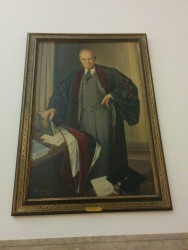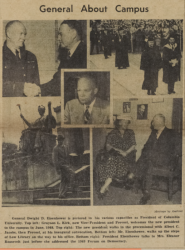While the highest-polling Republican candidate right now may look a lot like our University president, back in 1952, the president of Columbia University was actually elected president of the United States.
Dwight D. Eisenhower, who had been university president since 1948 on the date of his election in 1952, had spent a lot of his tenure in his role as commander of NATO, a post he assumed in 1950. Speculation on why Columbia chose such a world figure like Eisenhower has even lead to (debunked) rumors that Columbia had confused the general with his brother, a career college administrator.
- OBEY
- Farewell Spread in the Spec
So how did Columbia’s students react to Ike’s campaign for the White House?
Pretty poorly, actually. Like current Columbia students, they bemoaned the distance between the president and everyday campus life and had few good words to say about a Republican presidential candidate.
Even before Eisenhower had announced his run, a sharply critical article in the Spectator bashed him for neglecting “the only Presidency that didn’t creep into the volumes of newsprint his arrival [for a visit at Columbia] inspired.”
The editorial lambasted the general for devoting so much time to heading NATO and planning his political future that he neglected his role at Columbia. “General Eisenhower has broken the bargain,” the piece ended. “The least we could have expected from a University President was a clear, unequivocal, English sentence revealing a sound understanding of his duties, loyalties and obligations.”
The negativity continued when the editor of the Spectator appeared on the radio right before election day to argue against Eisenhower as president.
A columnist in the New York Daily Mirror defended Eisenhower, saying the Editorial Board did not represent the entirety of the Columbia community “of whom the majority are for Gen. Eisenhower.” A Columbia alumni group in favor of Eisenhower also attacked Spec for what it saw as biased coverage of the political campaign.
However, a poll showed that the board did at least represent the views of Columbia College, who supported Ike’s opponent Adlai Stevenson 770-399.
Even after being elected president of the US, Eisenhower stayed at his post until the last minute. In his resignation letter, he offered to leave on January 19, 1953. His farewell ceremony was on January 16, and he assumed the presidency on January 20.
A final, conciliatory Spec Editorial published right before Eisenhower left read, “We would be narrowly provincial to condemn him for this relative inattention to the University in the light of all the added national burdens which were placed on his shoulders.” It even ended saying, “We’d like to see Ike carry on in the important post of President of Columbia University, but we gurdgingly [sic] admit that his next job is slightly more important.”


 3 Comments
3 Comments



3 Comments
@Anonymous Columbia has had pretty much every major world leader speak over the past few years. A lot has to do with scheduling and how long they are in New York.
@hmmm Off topic, but wouldn’t Columbia love it if the pope included an address to the World Leaders Forum among his appearances in NY next week… Meantime Columbia has to content itself with the likes of the prime minister of Bangladesh and the prime minister of Chile, a second-time visitor.
@Anonymous Not really, because someone would start a protest because the Catholic church is staffed exclusively by Catholics, and that’s religious discrimination or something.